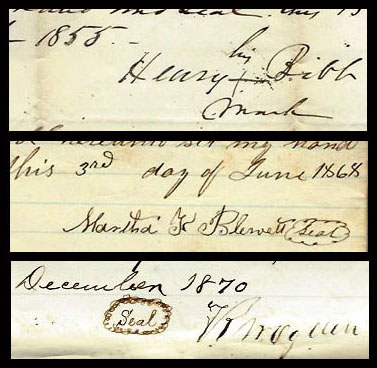During this National Make-A-Will-Month (yes, it’s a thing), we note the many historic examples of these solemn documents in the Manuscripts & Folklife Archives of WKU’s Department of Library Special Collections. Our collections of family papers often include wills and associated estate documents from Warren County and elsewhere. Our large collection of Warren County Equity Court cases includes lawsuits involving estates and a copy of the will that started all the trouble.
We also hold a collection of miscellaneous wills made primarily in Warren County but also in Tennessee, Virginia and Alabama. The oldest, made by local man Daniel Shipman in 1798, is one of several noncupative, or verbal wills: too sick to write out or sign the document himself, Shipman made his wishes known to two witnesses, who presented their memorandum to the County Court and attested to its truthfulness.
Like many antebellum wills, Shipman’s includes a bequest of slaves, but African Americans who had escaped bondage also made wills. The collection includes the 1853 will of Archy Barclay, a “free man of color” in Bowling Green, who gave “my body to the dust and my spirit to God,” then the rest of his possessions to his wife and children. Of note is his designation of Samuel A. Barclay, possibly his former master, as his executor. Henry Bibb, another free man of color, made a will in 1855 leaving his property “to Harriett Gray, a woman of color formerly owned by Joseph Gray of Russellville.”
Women’s wills in the collection are usually those of widows desirous of leaving property to children, grandchildren or to those who cared for them in old age. As we have seen, prior to 1894 the will of a woman with a living husband was of no effect, since her property became his upon marriage. A wife, however, could make a will devising property held in a trust or otherwise given to her on condition that it was free of her husband’s control; in the case of Martha Blewett’s 1868 will, she bequeathed it to her husband anyway, since he had “been kind and affectionate to me through all my afflictions.”
Many of the wills attest to the modest wealth and possessions of ordinary Kentuckians, but the 1870 will of Robert Ogden–made by a wealthy Warren County farmer, businessman and horse breeder “conscious of my mortality and desirous not to die intestate”–listed numerous generous bequests. Of great local significance was item 15, which gave $50,000 for the establishment in Bowling Green of a school for young men or young women. His trustees decided on the former, and Ogden College opened in 1877. In 1927, the college merged with WKU and the name is still familiar to every science student on the Hill.
Click on the links to access finding aids for these collections. For more, search TopSCHOLAR and KenCat.

